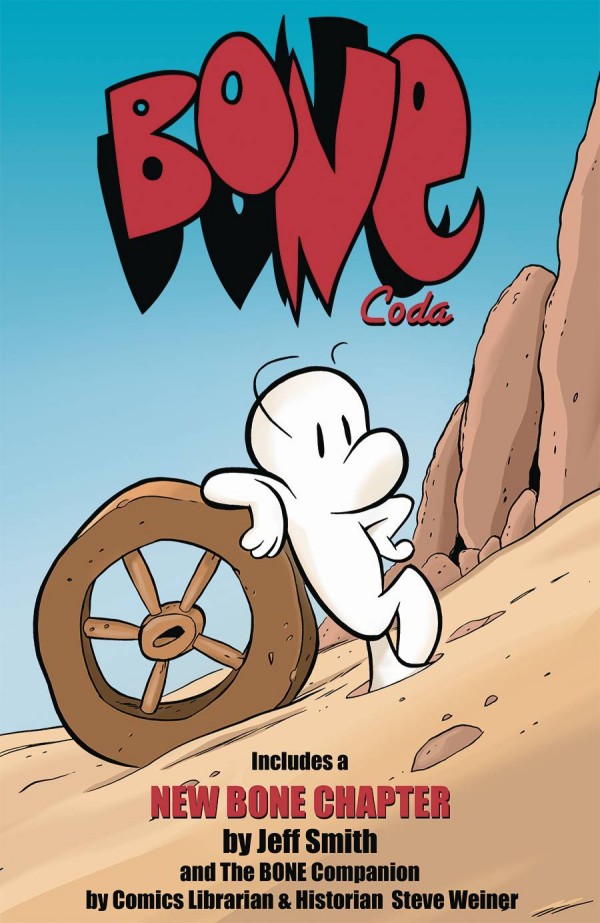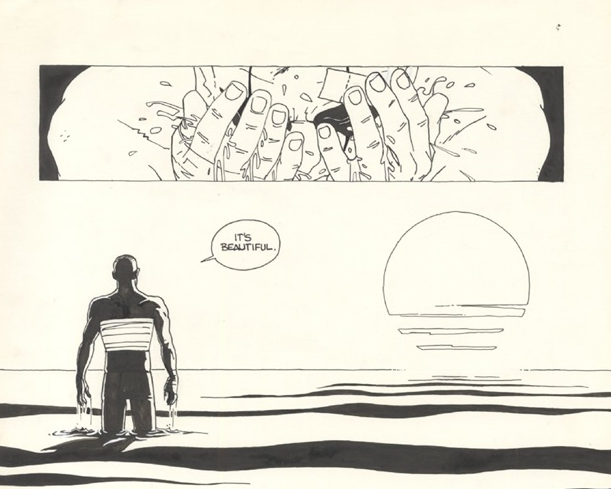 Written by Richard Stark
Written by Richard StarkAdapted by Darwyn Cooke
Illustrated by Darwyn Cooke
IDW
Sometimes there's nothing scarier than a wronged man.
Parker is a wronged man.
A criminal by profession, Parker was double-crossed by his wife and a shady partner who wanted the entire take. Somehow, he lived and burned with revenge. This is the story of a man determined to get back at those who tried to kill him, no matter what it takes. He'll even go so far as to take on the entire mob if the job requires it. Like a force of nature, Parker doesn't care who he has to kill to or who gets in his way. He is only Parker...the hunter.
There are two things that really struck me when I read this book. The first was Cooke's illustrations. I'm certainly a big fan of his work, but I feel like he knocked this one out of the park, using shading, pacing, and panel construction to great effect. This comic had the feel of dark crime fiction, with everything muted but dynamic.
The second thing that really struck me was just how brutal and violent the book is. Parker is a one-man wrecking machine, willing to do anything to get what he wants. He cheats, he threatens, he maims, and he kills. It doesn't matter how horrible the crime is in this book, if Parker feels that will get him what he wants (whether it's disfiguring his own wife's dead body or ruining the business of an old friend), that's exactly what Parker will do.
After finishing this book, I honestly wasn't quite sure what to think, mostly because of that latter attribute. I am no stranger to dark books or stories where horrible things happen. I also have no real issue with period pieces, as long as they're well written. Sure, it's rough reading material that's clearly racist but was acceptable at the time or watching women be merely props in a noir picture, but by placing it within the proper context, I can deal with it--provided I like the story.
Even within these tales, however, there's usually something redeeming about the main character. Marlowe might use slurs, beat innocent people up here and there, and use women for all they're worth, but at heart he's a good person. He's doing a few bad things to right a greater wrong. Further, I don't think Marlowe would ever kill someone just to get the answers he was seeking, unless they were a horrible person. Robert E. Howard's anti-heroes don't mow down people who aren't already in need of killing, and, moving into the comic world, the Punisher (when written right) won't kill just to meet his objective.
There's a morality that grounds these characters within their worlds, which are often cesspools of sin and vice. They can get knee-deep in the muck, but it's always with a clear head on their shoulders. Parker, on the other hand, wades in without so much as a pair of galoshes. He's absolutely ruthless in his pursuit of his goal, almost to the point of being a robot. If there is any shred of morality in the man, I can't find it. There's no code of honor, no desire to protect friends, and the only wrong that needs righting is personal. His pride has been hurt by a wife that betrayed him and a man who though he was smarter than Parker. And Parker, come hell or high water, will see them pay for it, until he gets back what is rightfully his.
As a result, Parker is not a character you are meant to like. Longtime readers of my reviews will know that I read books primarily for character, and I always try to find a way to link up to the character, even if they're the villain of the piece. I can admire Dr. Doom's sense of honor or read to see how a writer will interpret the Joker's twisted outlook on the world, for instance. The trouble I had with Parker is that there's absolutely nothing to like about him. He's amazingly good at killing people to get what he wants. That's his thing. He's cruel, he's without morals, and in this book, he comes out the winner.
Parker is an intelligent man, with cunning to spare. Instead of turning that into a force for good, he uses it for personal gain. He's a guy we'd expect to have a hard fall, but the man keeps on using his fists (drawn super-creepy in multiple places by Cooke) and just enough guile to get his way. Ironically, though his main character is just as evil as the rest of them, Stark's story here relies on the fact that most criminals, no matter how powerful, are basically dumb. I have to admit, the fact that Parker doesn't suffer here for his brutality bothers me. Because he's no better than the rest, I don't want him to do well. When he does reach his goals, I almost feel like the unseen god that controls such morality plays went off for a bathroom break and let Parker off the hook. Normally, I roll with whatever the author chooses to do, but here I wanted a type of closure that Stark wasn't going to give me. Even now, I'm still not sure how I feel about that.
Because I was unsure, I asked for some help. David Brothers, of the excellent Comics Alliance and 4th Letter took me up on the request, giving me a few ways to look at Parker as a character. Like me, David is a fan of crime stories, and he said he's run into the same problem I had with Parker, namely that the protagonist is just a total bastard. What do you do in that case? His suggestion was to admire the craft, but hate the craftsman. In the case of Parker, that means admiring his ability to get what he wants, even though what he does to get it might be horrible.
I can definitely see this as a strategy. After all, just because I disagree politically with several comic book writers does not mean I don't find their books to be really good. I can dislike the personal attacks a notable writer-artist makes with regularity and still want to read his comics over and over again. Why not apply the same principle to a fictional character?
Trying this with Parker definitely helps. Stark and Cooke do an amazing job of showing just how terrible Parker is as a human being, yet also how skilled he is in the art of deception and murder. The choice of descriptive language, which Cooke uses to frame certain scenes, is perfect for this world and setting. Cooke's stark depictions of murder and brutality mesh well with the text sections he's preserved, giving an overall feel of seediness that stays with you after you finish the book. You have to give Cooke credit--he could have tried to ratchet things down a notch or two for a modern audience (particularly in the handing of the women in the story), but instead, Cooke lets you have it with both barrels, much like Parker himself. We get the story of Parker, warts and all. That's exactly what a good adaptation should do.
Fans of Darwyn Cooke shouldn't be surprised by the quality of the illustrations. I've hinted at it here and there but I want to call out a few examples before finishing up this review. Cooke changes his page formatting almost at every turn, varying between stunning splash pages, nine-panel setups of the Kirby-Ditko vintage, and a constantly shuffling six-panel pattern, with the panel breaks occurring both randomly and naturally within the text. Within each panel, there is an intensity that drives the narrative. No space is wasted, no character is given a chance to breathe. People stare out at the reader with crazed eyes, shadows loom menacingly at the corners of the panel, and though the artwork resembles 1950s Art Deco more than Will Eisner, you can tell Cooke is using his ideas to make the story come alive off the printed page. Perspectives are off, keeping the reader on edge. If you aren't careful, Parker might just punch *you* while trying to take down his enemies! The whole effect is stunning and I think you could make an argument that this is Cooke's best work. (It's also more like what I wished his Spirit series had been.)
Overall, this book isn't going to be for everyone. The character is unlikable and the story is raw in its brutality, without even a hint of redemption in Parker or anyone around him. You have to work really hard to get past that flaw, even if you're used to dark stories, as I am. Once you do, however, two things come to light. The first is that Stark created a character who's every bit as smart as your average hero--but without one shred of decency. That in and of itself makes this work unique, if a bit hard to swallow at times. The second is that Darwyn Cooke is an unbelievable artist, one that I would follow on to just about any project. His craft here is off the charts. Be warned that the subject is a tricky one to like, but don't let that stop you. Hunt down a copy of this first Parker book today. Those who like crime fiction are in for a treat--even if you want to take several showers to wash off the stink of the characters. It will be worth the water bill.







